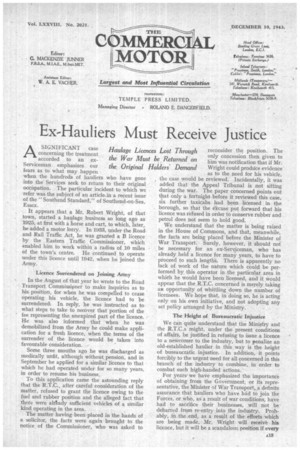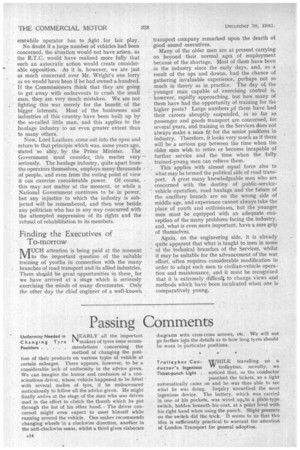Ex-Hauliers Must Receive Justice
Page 15

Page 16

If you've noticed an error in this article please click here to report it so we can fix it.
ASIGNIFICANT case concerning the treatment accorded to an ex, Serviceman emphasizes our fears as to what may happen when the hundreds of hauliers who have gone into the' Services seek to return to their original occupation. The particular incident to which we refer was the subject of an article.in a recent issue of the "Southend Standard," of Southend-on-Sea, Essex.
It appears that a Mr. Robert Wright, of that town, started a hanlage business so long ago as 1925, at first with a horse and cart, to which, later, he added a motor lorry. In 1933, under the Road and Rail Traffic Act, he was granted a B licence by the Eastern Traffic Commissioner, Which enabled him to work within a radius of 10 miles of the town's centre. He continued to operate under this licence until 1942, when he joined the Army.
Licence Surrendered on Joining Army In the August of that year he wrote to the Road Transport Conamissipner to make inquiries as to his position, for when he was compelled to cease operating his vehicle, the licence had to be surrendered-. In reply, he was instructed as to what steps to take to recover that portion of the fee representing the unexpired part of the licence. He was also informed that when he was demobilized from the Army he could make application for a fresh licence, when the terms of the surrender of the licence would be taken into favourable consideration.
Some three months ago he was discharged as medically unfit, although without pension, and in September he applied for a similar licence to that which he had operated under for so many years, in order to resume his business.
To this application came the astounding reply that the R.T.C., after careful consideration of the matter, refused to grant the licence owing to the fuel and rubber position and the alleged fact that there were alrtady sufficient vehicles of a similar kind operating in the area.
The matter having been placed in the hands of a solicitor, the facts were again brought to the notice, of the Commissioner, who was asked to reconsider the position. The only concession then given to him was notification that if Mr. Wright could produce evidence as to the need for his vehicle, the case would be reviewed: Incidentally, it was added that the Appeal Tribunal is not sitting during the war. The paper concerned points out that only a fortnight before it reviewed this case, six further taxicabs had been licensed in the borough, so that the acme put forward that his licence was refused in order th conserve rubber and petrol does not seem to hold good.
We understand that the matter is being raised in the House of Commons, and that, meanwhile, the facts are being placed before the Minister of War Transport. Surely, however, it should not be necessary for an ex-Servficeman, who has already held a licence for many years, to have to proceed to such length's. There is apparently no lack of work of the nature which could be performed by, this operator in the particular area in which he would have been licensed, and it would appear that the R.T.C. concerned is merely taking an opportunity of whittling .down the number of licensees. We hope that, in doing so, he is acting only on his own initiative, and not adopting any set policy arranged by the Ministry.
The Height of Bureaucratic Injustice We can quite understand that the Ministry and the R.T.C.s might, under the present conditions of affairs, be justified in refusing to issue a licence to a newcomer to the industry, but to penalize an old-established haulier in this way is the height of bureaucratic injustice. In addition, it points forcibly to the urgent need for all concerned in this branch of the industry to combine, in order to combat such high-handed actions.'
For years. we have emphasized the importance of obtaining from the Government; or its representative, the Minister of War Transport, a definite assurance that hauliers who have had to join the Forces, or who, as a result of war conditions, have had to sacrifice their businesses, will not be debarred from re-entry into the industry. Probably, in the end, as a result of the efforts which are being made, Mr. Wright will receive his licence, but it will be a scandalous position if every erstwhile operator has to fight for fair play.
No doubt if a large number of vehicles had been concerned, the situation would not have arisen, as the R.T.C. would have realized more fully that such an autocratic action would create considerable opposition. As it is, however, we are just as much concerned over Mr. Wright's one lorry as we would have been if he had owned a.hundred. If the Commissioners think that they are going to get away with endeavouts to crush the small man, they are very much mistaken. We are not fighting this war merely for the benefit of the bigger interests. Most of the businesses and industries of this country have been built up by the so-called little man, and this applies to the haulage industry to an even greater extent than to many others.
Now, Lord Leathers, come out info the open and return to that principle which was, some years ago, stated so ably, by the Prime Minister. The Government must consider, this matter very seriously. The haulage industry, quite apart from the operators themselves, employs many thousands of people, and even from the voting point of view it can exercise considerable power. Of course, this may not matter at the moment, or while a National Government continues to be in power, but any injustice to which the industry is subjected will be remembered, and then woe betide any politician who has in any way concurred with the attempted suppression of its rights and the refusal of rehabilitation to its members.
Finding the Executives of To-morrow /\4
UCH attention is being paid at the moment
/\4
UCH attention is being paid at the moment Vito the important question of the suitable training of youths in connection with the many branches of road transport and its allied industries. There shopld be great opportunities in these, for we have arrived at a stage which is seriously exercising the minds of many directorates. Only the other day the chief engineer of a well-knovin transport company remarked upon the dearth of good sound executives. Many of the older men are at present carrying on beyond their normal ages of employment because of the shortage. Most of them have been in the industry since the early days, and, as a result of the ups and downs, had the chance of gathering invaluable experience, perhaps not so much in theory as in practice. The day ot the younger man capable of exercising control is, however, rapidly approaching, but how many of them have had the opportunity of training for the higher posts? Large numbers pf them have had their careers abruptly suspended, in so -far as passenger. and goods transport are concerned, for several years, and training in the Services does not always make a man fit for the senior positions in industry. Therefore, it looks very much as if there will be a serious gap between the time when the older men wish, to retire or become incapable of further service and the time when the fully trained-young men can relieve them.
This applies with almost equal force also to what may be termed the political side of road transport. A great many knowledgeable men who are concerned with the destiny of public-servicevehicle operation, road haulage and the future of the ancillary branch are on the wrong side of middle age, and experience cannot always take the place of youth and enthusiasm„ but the younger men must be equipped with an adequate conception of the many problems facing the industry, and, what is even more important, have a sure grip of themselves.
Again, on the engineering side, it is already quite apparent that what is taught to men in some of the technical branches of the Services, whilst it may be suitable for the advancement of•the war. effort, often requires considerable modification in. order to adapt such men to civilian-vehicle operation and maintenance, and it milk be recognized that it is extremely difficult, to change views and methods which have been inculcated when one is comparatively young.




















































